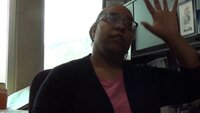| Title |
Andrews, Adrienne OH19_004 |
| Creator |
Weber State University, Stewart Library: Oral History Program. |
| Contributors |
Andrews, Adrienne, Interviewee; Harris, Kandice Interviewer; Rands, Lorrie, Video Technician |
| Description |
The Beyond Suffrage Project was initiated to examine the impact women have had on northern Utah. Weber State University explored and documented women past and present who have influenced the history of the community, the development of education, and are bringing the area forward for the next generation. The project looked at how the 19th Amendment gave women a voice and representation, and was the catalyst for the way women became involved in the progress of the local area. The project examines the 50 years (1870-1920) before the amendment, the decades to follow and how women are making history today. |
| Abstract |
The following is an oral history interview with Adrienne Gillespie Andrews, conducted on March 21, 2019 in her office, by Kandice Harris. Adrienne discusses her life, her memories at Weber State, and the impact of the 19th Amendment. Lorrie Rands, the video technician, and Alyssa Dove are also present during this interview.; The following is a video clip of an oral history interview with Adrienne Andrews. In this video clip, Adrienne discusses how the 19th Amendment impacted women and civil rights for women of color. |
| Subject |
Voting--United States; Women--suffrage; Women's rights; Universities and colleges; Women in higher education; Women college administrators |
| Keywords |
Gender equality; Civil Rights; Female voters |
| Digital Publisher |
Stewart Library, Weber State University, Ogden, Utah, United States of America |
| Date |
2019 |
| Date Digital |
2019 |
| Temporal Coverage |
1974; 1975; 1976; 1977; 1978; 1979; 1980; 1981; 1982; 1983; 1984; 1985; 1986; 1987; 1988; 1989; 1990; 1991; 1992; 1993; 1994; 1995; 1996; 1997; 1998; 1999; 2000; 2001; 2002; 2003; 2004; 2005; 2006; 2007; 2008; 2009; 2010; 2011; 2012; 2013; 2014; 2015; 2016; 2017; 2018; 2019 |
| Medium |
Oral History |
| Spatial Coverage |
Layton, Davis, Utah, United States, http://sws.geonames.org/5777107, 41.06022, -111.97105; Denver, Denver, Colorado, United States, http://sws.geonames.org/5419384, 39.73915, -104.9847; Trenton, City of Trenton, Mercer, New Jersey, United States, http://sws.geonames.org/5105496, 40.21705, -74.74294; Mankato, City of Mankato, Blue Earth, Minnesota, United States, http://sws.geonames.org/5036420, 44.15906, -94.00915; Ogden, Weber, Utah, United States, http://sws.geonames.org/5779206, 41.223, -111.97383' |
| Type |
Text; Image/StillImage; Image/MovingImage |
| Access Extent |
PDF is 66 pages; Video clip is an mp4, 108 MB |
| Conversion Specifications |
Filmed using a Sony HDR-CX430V digital video camera. Sound was recorded with a Sony ECM-AW3(T) bluetooth microphone. Transcribed using Express Scribe Transcription Software Pro 6.10 Copyright NCH Software. |
| Language |
eng |
| Rights |
Materials may be used for non-profit and educational purposes, please credit University Archives; Weber State University |
| Source |
Andrews, Adrienne OH19_004 Weber State University Archives |
| Format |
application/pdf; video/mp4 |
| ARK |
ark:/87278/s6fwxcv2 |
| Setname |
wsu_bs_oh |
| ID |
105416 |
| Reference URL |
https://digital.weber.edu/ark:/87278/s6fwxcv2 |
| Title |
Andrews, Adrienne OH19_004 |
| Creator |
Weber State University, Stewart Library: Oral History Program. |
| Contributors |
Andrews, Adrienne, Interviewee; Harris, Kandice Interviewer; Rands, Lorrie, Video Technician |
| Description |
The Beyond Suffrage Project was initiated to examine the impact women have had on northern Utah. Weber State University explored and documented women past and present who have influenced the history of the community, the development of education, and are bringing the area forward for the next generation. The project looked at how the 19th Amendment gave women a voice and representation, and was the catalyst for the way women became involved in the progress of the local area. The project examines the 50 years (1870-1920) before the amendment, the decades to follow and how women are making history today. |
| Abstract |
The following is an oral history interview with Adrienne Gillespie Andrews, conducted on March 21, 2019 in her office, by Kandice Harris. Adrienne discusses her life, her memories at Weber State, and the impact of the 19th Amendment. Lorrie Rands, the video technician, and Alyssa Dove are also present during this interview. |
| Image Captions |
Adrienne Andrews 2019 |
| Subject |
Voting--United States; Women--suffrage; Women's rights; Universities and colleges; Women in higher education; Women college administrators |
| Keywords |
Gender equality; Civil Rights; Female voters |
| Digital Publisher |
Stewart Library, Weber State University, Ogden, Utah, United States of America |
| Date Digital |
2019 |
| Temporal Coverage |
1974; 1975; 1976; 1977; 1978; 1979; 1980; 1981; 1982; 1983; 1984; 1985; 1986; 1987; 1988; 1989; 1990; 1991; 1992; 1993; 1994; 1995; 1996; 1997; 1998; 1999; 2000; 2001; 2002; 2003; 2004; 2005; 2006; 2007; 2008; 2009; 2010; 2011; 2012; 2013; 2014; 2015; 2016; 2017; 2018; 2019 |
| Medium |
Oral History |
| Spatial Coverage |
Layton, Davis, Utah, United States, http://sws.geonames.org/5777107, 41.06022, -111.97105; Denver, Denver, Colorado, United States, http://sws.geonames.org/5419384, 39.73915, -104.9847; Trenton, City of Trenton, Mercer, New Jersey, United States, http://sws.geonames.org/5105496, 40.21705, -74.74294; Mankato, City of Mankato, Blue Earth, Minnesota, United States, http://sws.geonames.org/5036420, 44.15906, -94.00915; Ogden, Weber, Utah, United States, http://sws.geonames.org/5779206, 41.223, -111.97383' |
| Type |
Text; Image/StillImage |
| Language |
eng |
| Rights |
Materials may be used for non-profit and educational purposes, please credit University Archives; Weber State University |
| Source |
Andrews, Adrienne OH19_004 Weber State University Archives |
| Format |
application/pdf |
| Setname |
wsu_bs_oh |
| ID |
105521 |
| Reference URL |
https://digital.weber.edu/ark:/87278/s6fwxcv2/105521 |





